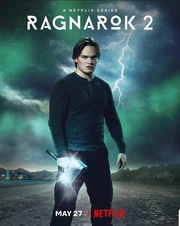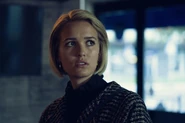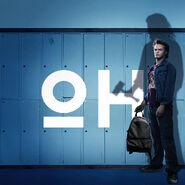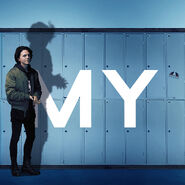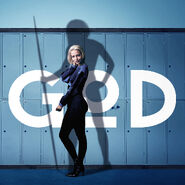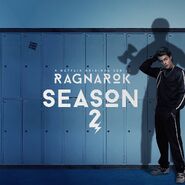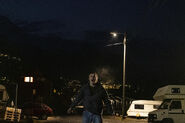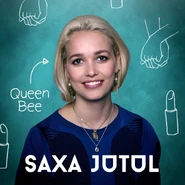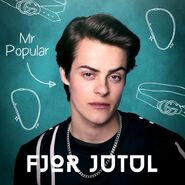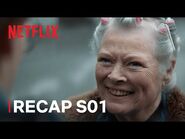Ragnarok is a Norwegian fantasy drama streaming television series reimagining of Norse mythology from Netflix.
The series premiered in January 2020, with a second season released in May 2021. It is Netflix's third Norwegian-language TV series, following Home for Christmas and Lilyhammer. The series is produced by the Danish production company SAM Productions.
On November 11, 2021, Netflix announced that the series was renewed for a third season, which would be its final season.[1]. It premiered on August 24, 2023.
Synopsis
The show takes place in current day, in the fictional Norwegian town of Edda in Hordaland, Western Norway, which is plagued by climate change and the industrial pollution caused by the factories owned by the local Jutul family, the fifth-richest family in Norway. The Jutuls are actually four giants posing as a family in Edda. They are challenged by Magne, a teenage boy who is surprised to learn that he is the embodiment of Thor and begins the fight against those who are destroying the planet. In the second season, he is joined by more people who embody other Gods.
Cast
Main
- David Stakston as Magne Seier, the reincarnation of the Thunder-God, Thor.
- Jonas Strand Gravli as Laurits Seier, Magne's half-brother. He is the reincarnation and reimaging of the Mischief-God, Loki. Loki's story was changed from true mythology, erasing Angerboda and making his children born from him.
- Herman Tømmeraas as Fjor Jutul, the high-school-age "son" in the Jutul family of Jötnar from Norse mythology.
- Theresa Frostad Eggesbø as Saxa Jutul, the high-school-aged "daughter" in the Jutul family. Based on Járnsaxa.
- Henriette Steenstrup as Turid Seier, Magne's and Laurits' mother.
- Synnøve Macody Lund as Ran Jutul, principal of the high school and "mother" in the Jutul family.
Former Main
- Emma Bones as Gry Isungset, Magne's and Fjor's former love interest. She and her mother left Edda in the second season.
- Gísli Örn Garðarsson as Vidar Jutul, local tycoon and "father" in the Jutul family. He died in the second season.
Supporting
- Billie Barker as Signy, Magne's new love interest.
- Danu Sunth as Iman Reza, the reincarnation of the Love-Goddess Freyja, who can manipulate minds.
- Bjørn Sundquist as Wotan Wagner, the reincarnation of the Wisdom-God Odin.
- Benjamin Helstad as Harry, the reincarnation of the War-God Týr.
- Ylva Bjørkaas Thedin as Isolde Eidsvoll, Magne's green activist friend.
- Odd-Magnus Williamson as Erik Eidsvoll, Isolde's father and a teacher at the high school.
- Tani Dibasey as Oscar Bjørnholt
- Iselin Shumba Skjævesland as Oscar's mother, Yngvild Bjørnholt, a local police officer.
- Espen Sigurdsen as Halvor Lange
- Eli Anne Linnestad as Wenche. Her real identity is Völva. She awakens Magne's and Iman's powers.
Development
TBA
Tropes
- Ambiguous Disorder: Magne has something, which could be ADHD or maybe a degree of autism. He is shown to have had problems with aggression in the past and uses a stim toy to focus. The only clear diagnosis we hear is that he has dyslexia.
- Anyone Can Die: The show doesn't have a terribly high body count, but the deaths that do happen tend to be unexpected.
- Audible Sharpness: The "old weapons" sing when wielded, even casually sometimes. Justified as they are imbued with old magic that bypasses the nigh-invulnerability of gods and giants.
- Bilingual Bonus: There are several spoken sentences in Old Norse that have no subtitles (at least in "English (CC)", they are translated in "English (British)"), but are understandable for anyone who understands Icelandic.
- Betty and Veronica: Laurits lampshades the trope in all but name for Gry. Laurits: I must say, it looks like you're into all kinds of different guys. I mean, like there's Magne who you can define as the hushed, heavy, but honest type. and then there's Fjor, here, who's more like handsome and grave and mysterious.
- Bury Your Gays: Isolde, a lesbian, dies at the end of the first episode and is the first named character to die.
- Cool House: The Jutul family lives in a large mansion in the otherwise shabby and run-down town of Edda. Most notably, the siding at least is rich dark wood, and the house has carved dragon heads (like those found on the prows of Viking longships) at every possible corner of its already-elaborate roof (the roof peaks three times in succession, and has a tower in the middle of the highest peak.)
- Dictionary Opening: Every episode begins with the definition of something from Norse Mythology, most often related (however tangentially) to the episode itself. At times it borders on Interface Spoiler.
- Dumb Muscle: Deconstructed. Magne presents this way thanks to his mental disabilities, which makes him seem slow or stupid in academic and social situations. But he shows he's actually very intelligent, both in circumventing his disabilities (using text-to-speech programs to read and write to overcome his dyslexia, for one), and in thinking through his options and choices logically and analytically (unless his blood is up, at which point he tends to act without thinking). He's easily able to research things he finds important, such as Edda's rate of climate change and his performance in things like a 100-meter sprint or hammer throw against current world records. And, of course, Norse Mythology, once he realizes how relevant to him it is.
- Evil, Inc.: The JUTUL company. Not only does it pollute the environment and make their employees sick, they are also owned by a family of violent giants.
- The Family That Slays Together: The Jutuls are a family of Giants, and not at all averse to violence and murder.
- Forging Scene: The final episode of Season Two, in which Magne, with the help an avatar of Tyr and a "dwarf," reforge Mjølnir, using the Volva's feather so it can fly and always return, and an arrowhead of the old world so it can harm giants.
- Good Smoking, Evil Smoking: More like good tobacco use bad tobacco use. Isolde uses snus (chewing tobacco), but points out that she's only hurting herself with it, and that's her choice. The Jutuls smoke fairly prominently, showing a comparative disregard for the people who happen to be in their vicinity. Laurits is briefly shown to smoke, hinting at his morally ambiguous character. Wenche is also shown to smoke, and based on the implications that she has some kind of connection to Odin, this reinforces the Grey-and-Gray Morality Norse myths ran on. . . Odin is the chief heroic deity, but he is not in any way the Big Good. The Jutuls and Laurits also smoke indoors (of their own houses, but still), while Wenche smokes outside. . . a subtle but important distinction.
- Green Aesop: Pollution and climate change are bad, nature is good.
- Heroic BSoD: Magne after he kills Vidar in Season Two. Even though he'd been heading towards a fatal confrontation with the Jutul the whole series, he wasn't prepared for the impact actually taking someone's life would have. Laurits calling him "murderer" for killing his biological father isn't helping.
- The Hero's Journey: The show plays this fairly straight, with Wenche even stating "The Hero's Journey has begun" early in the first season.
- It begins with Magne and his family returning to their original hometown, which also happens to be a Town with a Dark Secret (and thus, the "Land of Adventure," in a way).
- Very soon after arriving, Magne is given his powers (or has them unlocked) by Wenche, granting him Supernatural Aid and doubling as the Call to Adventure.
- Isolde's death and Magne's insistence it was not an accident serves as Crossing the first Threshold, with the police (and to a lesser extent, the town at large) as largely unwitting Threshold Guardians, in a case of (relatively) Minor Crime Reveals Major Plot.
- His visit to "Jutulheim" serves as a true Land of Adventure, where things take on a dreamlike, slightly-surreal quality (due in part to Magne getting rather drunk), where he flaunts his newfound powers before his enemies (though he's not fully aware they're his enemies just yet).
- "Spiritual Death and Rebirth" comes as the Jutul's more and more effectively thwart his attempts to defeat them and make him appear to be an unstable, dangerous young man. It gets to the point where Magne seems to actually believe that he's merely suffering from paranoid schizophrenia, and willing to along with the doctor's treatment to get better. It isn't until Fjor tells Magne he was right about the barrels of toxic waste that Magne re-commits himself to The Call, embracing his power and his duty to defend humanity from the Jotuns.
- And all of the above is part of Magne's Road of Trials in the first season. Erik is a very interesting take on The Shapeshifter, genuinely nice and caring, but hindering Magne several times not out of malice, but out of doing what he believes is right. Laurits also fills that role, as you can basically toss a coin to figure out if he'll help or hinder Magne in any given moment. Saxa could be a downplayed Temptress, while the Goddess is deconstructed, subverted, and split between Isolde (her passion for saving the environment, especially around Edda, and her death are Magne's primary motivations through the entire first season) and Gry (Magne quickly falls in love with her, but she's not interested in him like that, and is herself falling for Fjor despite knowing its a bad idea), with Signy picking up the slack in Season Two as Magne starts to get interested in her and she in him.
- The "Night Sea Voyage" actually comes before "Death and Rebirth," as Magne retraces Isolde's steps to find the same cave and the evidence against JUTUL.
- Apotheosis/Fight against the Big Bad/Ultimate Boon: Played straight as an arrow. Magne fully embraces his role as Thor, snatching up a hammer to smash up Fjor in a Curb-Stomp Battle. Then he's faced down by Vidar, who's a lot stronger than Magne anticipated. Just as he seems defeated, Magne calls down the lightning, blasting him and Vidar back in what seems like a Mutual Kill. But the last shot of Season One is Magne's hand curling into a fist, showing he's not dead yet. This doubles as a second, more literal, "Death and Rebirth," with the implication that Magne has now fully embraced his power and duty as Thor (Vidar even addresses him as "Thor" at the start of their fight).
- History Repeats: The show's premise can be summed up as "the Norse myths of Gods and giants are real, and everything that happened in the ancient past is about to happen again in the present day".
- Immortal Life Is Cheap: Only the invincible guy (Magne) is absent-minded enough to be run over by a vehicle out of the blue and purely by coincidence.
- I Own This Town: The Jutuls have lived in Edda since time immemorial, their factory is the town's main employer, the local radio station is practically their personal propaganda mouthpiece, and pretty much every minor and major investment in the town comes from them. They eat for free in the diner and get free haircuts at the barber without even having to ask for it. They have the police, the mayor and the entire school faculty under their thumb. In short, if you mess with the Jutuls, you're gonna regret it. Things look quite a bit different in Season 2 after Magne revealed their illegal toxic waste dump to the public in the Season 1 finale.
- Istanbul (Not Constantinople): The town in which the series takes place is called "Edda" instead of "Odda", the real name of the shooting location. This is a reference to the Poetic Edda and the Prose Edda, the two main sources of Norse Mythology.
- Love Triangle: Magne quickly falls for Gry, who likes him but not like that. Fjor likes Gry, but she doesn't like him as much as he likes her. Except she does, despite knowing it's a bad idea, and the two are officially in love by the end of the first season. Of course, small town politics, pollution, personal morals, and the fact that Fjor is a giant and Magne is Thor makes this far more complicated than it already is.
- Magical Defibrillator: Zig-Zagged. Episode one of season two opens with two paramedics arriving to the aftermath of Magne and Vidor's fight. One orders the other to defibrillate Magne, which backfires on the poor paramedic but brings Magne right around. You really shouldn't defibrillate someone without at least checking them first, but when that someone has the power of Thor, a little electricity can only be a good thing.
- Mythology Gag: Literally.
- In Norse Mythology, Magni is one of Thor's sons.
- Much like Magne, Thor had severe anger management issues, even to the point of (in some tellings) being sent away from Asgard to be raised by foster parents better able to teach him to control his temper. Either way, while Thor definitely mellowed in adulthood, he never quite lost his Hair-Trigger Temper, and everyone (God or otherwise) very quickly learned to be rather cautious around him.
- "JUTUL" is very similar to Jotun, one of the more famous breeds of giants in Norse Mythology. The connection is made explicit by the title of episode 3, "Jutulheim," where "Jotunheim" is the place from which Jotuns hail.note
- Wotan, the old man with the eyepatch, is one of the names of Odin (though it's more often rendered as "Woden"), lending this mysterious man and his equally-mysterious wife some connection to Norse myth.
- The whole last third of "Jutulheim" is basically a modern retelling (in different context) to Thor, Loki, and Thialfi at the hall of Utgard-Loki, where Thor and his companions were goaded into rigged contests by the giants to test their capabilities, and despite appearing to Epic Fail performed so well Utgard-Loki banned them forever out of fear of their power. In particular, Thor faced a test of strength (lifting Utgard-Loki's cat, which was actually the Midgard Serpent, in the myth; arm-wrestling in the show), and a drinking contest (draining Utgard-Loki's drinking horn, which was actually linked to the sea in the myth; doing shots and drinking mead (from a proper drinking horn, no less) in the show). In the myth, Utgard-Loki simply wanted to gauge how big a threat the Asgardians were, coming up with the answer "VERY." In the show, the Jutuls are trying to figure out who Magne is that he has all these superhuman qualities, and seem to quickly realize they've invited a new avatar of Thor into their home.
- In Season Two, Laurits ends up deliberately following in Loki's footsteps once it's revealed he's Vidar's son, and thus a giant, then stealing some of Wotan's blood to become "Odin's Blood Brother" as Loki in myth was. Some combination of these ends up giving him a tapeworm, which is actually a new incarnation of the Midgard Serpent, which he hides in a fish tank in his room, as Loki tried to keep his deformed children (Jormungandr, Fenrir, and Hel) hidden from Odin. But as Odin discovered Loki's monstrous children, Turid finds her son's pet snake.
- The Forging Scene in which Magne recreates Mjölnir, including a Volva's feather and old world arrowhead (recalling Norse Mythology's use of Insubstantial Ingredients. The "dwarf" is also operating the bellows to stoke the eternal flame the hammer needs to be forged in; working the bellows to keep the fire hot enough was the main important thing in the mythological forging of Mjölnir (and two other artifacts by that team of dwarves), and Loki screwed up that process, thus Mjölnir having a handle too short for its size. The handle of this Mjölnir is also too short, due to circumstances beyond the characters' control.
- Nice Job Breaking It, Hero: In the first episode of season two, Turid decides to tell Laurits something she should have told him a long time ago. He's not her husband's son, but Vidar's, after Turid and Vidar had a drunken one night stand. She also tells Vidar. Since Fjor has decided to abandon his family to be with Gry, Vidar just so happens to be in the market for a backup son, especially one so close to his most dangerous enemy. The episode ends with Magne watching Vidar and Laurits share a warm, fatherly embrace.
- No Communities Were Harmed: Despite being called Edda, it basically still very much is Odda. For example, when Magne looks at a map of Edda, it is a map of Odda (with the labels changed to Edda).
- Not What It Looks Like: Audio variant. Episode one of season two Magne's looking for allies in his fight against the giants, and finds Iman, who was also touched by Wenche. Magne tries to explain to her about the war and godly powers by bringing her home and discussing the matter in his room. Turid just thinks her son has brought a pretty girl home. Then Magne demonstrates his power by lifting a chair with Iman in it and a TV in her lap up to the ceiling over and over. Turid and Laurits just hear girlish laughter and a repetitive bumping sound.
- Rage Against the Heavens: At the start of season 2, seeing a crow in the sky, Magne starts shouting at it, believing it to be Wenche and wanting a least some advice or guidance about where to go from here. Throwing a rock at the bird into the cloudy sky and demanding answers kicks the scene into this trope, especially given the heavy mythological leanings of the series.
- Really 700 Years Old: The Jutuls, being Old Norse giants, are immortal. Their exact age is unknown, but Season 2 implies they're at least 3,000 years old.
- Shout-Out: When Magne gets a Mjölnir made in Season Two, is almost an exact replica of Marvel's Mjölnir.
- Stay in the Kitchen: The Jutul have some pretty old-fashioned ideas about gender role, with Vidar and Fjor taking turns running Jutul Industries and posing as each other's fathers to hide the fact they're immortal. Saxa isn't exactly pleased that she doesn't get a chance to lead the family. That said, when it comes to facing the Gods of Asgard in battle, the women are expected to take up arms and fight beside the men.
- Stock Scream: In episode one of season two, a paramedic gives the Wilhelm Scream as he tries to defibrillate Magne and it doesn't go according to plan.
- Struggling Single Mother: Turid has shades of this. She can't afford a lot of new things for her sons, and she is anxious when Magne wants to write his paper criticizing JUTUL because she can't afford to lose her job there, and is also scared that this will lead to Magne ending up in prison because of the dog incident. When Magne is eventually expelled from school, Turid becomes depressed and lies on the couch eating masses of chocolate. Laurits' comment to Magne implies that this isn't the first time that this happened.
- Superpower Lottery: Magne gets a pretty good roll, earning Super Strength, low-grade Super Speed (beating the world record 100-meter dash time by 2.5 seconds, an eternity in that sport), Nigh-Invulnerability (being outright run over by a heavy snow plow with barely a scratch), Super Senses, and the ability to sense the weather. Justified, as he is basically a reincarnation of Thor, who had pretty much this power set in myth (give or take a few others, depending on which version of the myths you're looking at).
- Surprisingly Realistic Outcome: Deciding he needs Mjölnir to fight the Jutul, Magne goes to an auto mechanic to have him forge a hammer that looks much like Mjölnir. It doesn't return when he throws it or have any power of its own. Mjölnir was one of the most powerful weapons ever forged by the finest dwarven smiths with extra motivation to make sure the job got done right, it can't be recreated by some random dude in his workshop (especially when this random dude isn't told he's making a Godly weapon in the first place). Wenche has to spell this out for Magne when he asks why the hammer isn't working.
- Take a Third Option: In a meta sense. In the myths upon which the show is based, despite Thor and Loki overlapping a lot in the stories, they weren't brothers (if anything, Loki was sort of Thor's semi-uncle). Loki was "Blood Brother" to Odin. But the most famous recent interpretation of them casts them as brothers. The show makes Laurits a giant, being Vidar's illegitimate son, but still Magne's brother through Turid, and Laurits steals some of Wotan's blood to become "Blood Brother to Odin," putting both the original mythological connection and the modern pop culture one in at the same time.
- Title Drop: Once per Episode. Series-wide, the first episode starts with Dictionary Opening defining Ragnarok, and it's later brought up in Magne's history class. Interestingly, the term is skirted for the rest of the first season, with the Jutul referring to it as "The Last Battle."
- Took a Level in Kindness: Fjor, as he gets closer to humans and Gry. And then he pulls a complete 180 after Magne accidentally kills Vidar and Fjor takes up the mantle of evil family patriarch.
- Villain with Good Publicity: The Jutuls are very much the villains of the series, but the whole of Edda pretty much worships the ground they walk on due to how good they are at keeping their dirty secrets hidden. The facade starts cracking, along with their reputation, at the end of Season One.
- Weirdness Censor: The people of Edda are almost militantly oblivious to all the weird shit going on in their town. Even those who directly witness clearly supernatural stuff and do take note for once basically turn around, go "meh, whatever", and continue where they left off like nothing happened.
- Wham Shot: The last shot of Season Two. Laurits didn't die in Magne's arms, but has been taken in by the Jutuls, and releases the larval Midgard Serpent into the waters around Edda. If you know your mythology, you know that Thor will kill Jormungandr come Ragnarok. . . but will be poisoned by the creature's bite, making it only a few steps before dying.
Multimedia
Images
External Links
 Follow Ragnarok (@ragnaroknetflix) on Instagram
Follow Ragnarok (@ragnaroknetflix) on Instagram
Trivia
- Jonas Strand Gravli (who plays Laurits) was 27 when the first season was shot.
- Herman Tømmeraas (Fjor) was 22.




